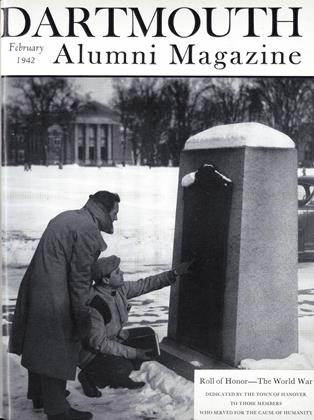THE WARTIME SPEED-UP which Dartmouth inaugurated among American colleges on December 13 was carried still further with the announcement during Christmas vacation that a summer term of regular semester length will be offered this year to help speed men through their college courses. Announcement of the voluntary summer term was made by President Hopkins in a printed statement dated December 26 and mailed to all students at their homes.
The additional semester will start on or about May 25, two weeks after the early Commencement date adopted in the faculty's speed-up plan, and will end on or about September 3. This period of fifteen weeks, including one week for examinations, will provide enough time for a full semester's work and, in the case of certain courses, for a full year's work.
Further details in connection with Dartmouth's summer instruction were held up pending the return of students from Christmas vacation and the canvassing of their opinions and desires in the matter. In his first announcement President Hopkins declared that the summer program would be worked out with great care "in order that this may with maximum effectiveness fit the needs of the National Government and the requirements of the individual student." Final plans would be adopted, he stated, after consultation with Government officials and after providing opportunity to the students to give expression to their needs and wishes.
A questionnaire, seeking to ascertain the approximate number ot men who would continue their studies during the summer and the fields in which they would probably elect courses, was distributed to all juniors, sophomores and freshmen on January 9 with the request that answers be given to the College administration by January 17. Early returns indicated that those who definitely planned or hoped to enroll for the summer term widely outnumbered those who did not expect to take advantage of the speed-up program.
An accompanying letter from President Hopkins was mailed out with each questionnaire. In it Dartmouth's head announced that it is proposed to offer three types of courses during the summer: (1) second-semester or even-numbered courses; (2) odd-numbered courses which are normally offered in every semester; and (3) full-year courses ordinarily given in two semesters, such as Mathematics 3-4, which will meet six times a week and will be the equivalent of two ordinary semester courses. The student must elect courses totaling 15 hours, which is a full semester's schedule, and may reach this total through any combination of full-year and semester courses.
By taking advantage of the continuous program available at Dartmouth, students now in College may be graduated approximately as follows: Class of 1943 in December, 194 a, or January, 1943; Class of 1944 in September, 1943; and Class of 1945 in April or May, 1944.
President Hopkins has announced that the expense for tuition and room rent during the summer term will not exceed the regular semester charge. No decision has yet been made with regard to the entering Class of 1946.
The Thayer, Tuck, and Medical Schools at Dartmouth have already announced that they will operate on a year-round, three-term basis. Under the College plan adopted by the faculty on December 19, the remainder of the present academic year has been telescoped, through elimination of vacations and halving of examination periods, to advance Commencement from June 14 to May to, a saving of five weeks' time without any loss of scholastic work.
 View Full Issue
View Full Issue
More From This Issue
-
 Article
ArticleUseless Dartmouth Information
February 1942 By LEON BURR RICHARDSON '00 -
 Sports
SportsBig Green Teams
February 1942 -
 Article
ArticleDartmouth Keeps 'Em Flying
February 1942 By MAJOR WILLIS S. FITCH '17 -
 Class Notes
Class Notes1917*
February 1942 By EUGENE D. TOWLER -
 Class Notes
Class Notes1918*
February 1942 By ERNEST H. EARLEY -
 Class Notes
Class Notes1937*
February 1942 By DONALD C. MCKINLAY
Article
-
 Article
ArticleWINTER CARNIVAL PLANS
-
 Article
ArticleDR. F. P. LORD STUDYING RURAL DISTRICTS OF STATE
December 1921 -
 Article
ArticleCANOE DROPOUT
Jan/Feb 2006 By Bill Gifford '88 -
 Article
ArticleLessons from Prison
MARCH 1994 By Erin Murphy '95 -
 Article
ArticleBig Green Teams
MAY 1972 By JACK DEGANGE -
 Article
ArticleBig Green Teams
October 1974 By JACK DEGANGE

